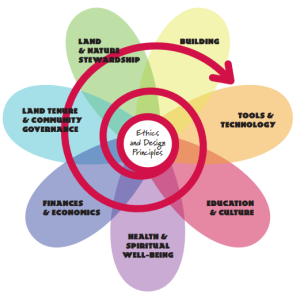Currently Empty: ₨0.00
Permaculture

PERMAnent CULTURE, as a concept was originally coined in the mid-seventies by two Australians, David Holmgren and Bill Mollison.This culture follows the NATURES PATTERNS to create SUSTAINABLE HUMAN HABITATS. It is basically a land use and community building movement that is striving for a harmonious integration of human dwellings, microclimate, plants, animals, soils and water and the major aspect of this culture is basically the relationship among all these elements. Permaculture has a great value as it can be used as a movement to impede the current agriculture trend that isolates us humans with nature and its elements.
I travelled for a 10 day course in Hasera about 40 km east of Kathmandu for a permaculture course. My work in organic farming has interested me to learn more about working not only to grow food but to grow food while also creating life in the working elements of nature such as the soil, water, air, birds, animals and all the insects that are around while working in the field.
The few days spent and learnt have been valuable. It is not just while working with the earth that we think about bringing the concept of organic but I realised that relationships we build around socially need to be equally a part of this concept. The greatest lesson has been “ change the way I see things”. I saw that while we work with nature, there is no such thing as good or bad. Everything is serving its purpose. Even the very insects we call as pests and we want to get rid of are all playing their part. So killing pests is not a way but working with them to help the farm is important. This brought into an interesting principle of Permaculture which says, “ to see problems as solutions”. I was amazed how this brings a completely different working pattern in the field. I have realised that there are more options rather then just killing the pests.
As part of my reading and overall understanding I understand that Permaculture is based onthe ethics of “living as part of a larger community”- one that sets itself outside of individualism. We are a part of a bigger picture and it is important to always understand that what we choose will always have an affect in the greater community that we share this planet with. So this culture is based on a holistic value rather than that of individualism and indifference.
Some aspects that I would like to share with everyone:
- Take time to take care of the earth (all living and non living things) maybe look at the sunrise and appreciate or go plant something and wait and watch overtime as things happen to it.
- Take care of the people around you- help promote self- reliance and community responsibility.
- Give away the extras- you don’t need too much. Give away your time, labour, money, and energy to achieve the aims of earth care and people care.
